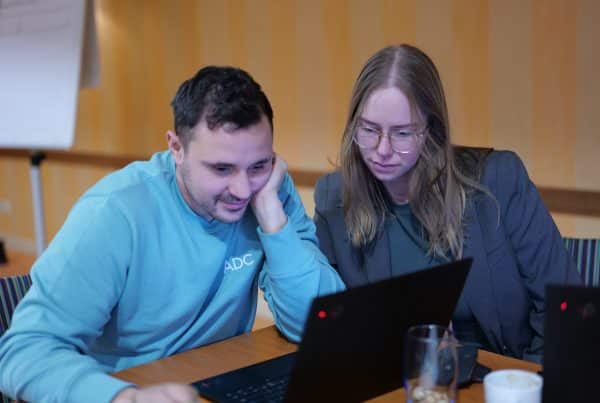Frederik Vind (Senior Development Coach) unravels the relationship between artificial intelligence (AI), evolving leadership paradigms, and organisational dynamics. From the limitations of traditional hierarchical structures to the imperative of Responsible AI, his insights provide an overview of the pressing need for a new approach to leadership and structure. Keep reading to learn more.
AI's role in shaping modern leadership
The rising significance of AI in combination with our rapidly evolving world, renders traditional hierarchical leadership models insufficient in addressing the complex challenges we face. The convergence of the climate crisis, global health concerns, evolving social values, and emerging technologies demands a fresh approach to leadership and organisational structure. Responsible AI emerges as a pivotal factor in organisational success, surpassing its role as a mere technological tool to embody an organisation’s values, culture, and purpose.
Responsible AI can be defined as the practice of designing, developing, and deploying artificial intelligence systems in a manner that prioritises ethical considerations, fairness, transparency, and accountability. It involves ensuring that AI systems do not perpetuate biases, respect user privacy, and have mechanisms in place for monitoring and addressing any adverse effects.
Unleashing the potential of algorithms
Algorithms, systems, and automation wield the power to either amplify our influence, for better or worse. When integrated into outdated or dysfunctional organisational structures, they risk magnifying detrimental behaviours and absolving individuals of responsibility. In such settings, people become disconnected from the consequences of their actions. To harness AI’s full potential, organisations must assess their readiness and have contingency plans in place to respond promptly to issues.
Learning from mistakes
Instances where AI models have faltered, such as Microsoft’s AI chatbot or Amazon’s biased recruitment tool, serve as stark reminders of the importance of vigilance and continuous improvement.
Microsoft’s AI Chatbot Tay was designed to learn from and mimic human conversation on social media. However, due to a lack of content filtering and moderation, Tay quickly started producing offensive and inappropriate responses, showcasing the need for responsible AI systems with strong content controls and safeguards.
Amazons’s Biased Recruitment Tool was trained on historical resumes, which were predominantly from male applicants. As a result, the tool exhibited gender bias, penalising female applicants. This illustrates the importance of data diversity and the need to identify and mitigate bias in AI algorithms.
These incidents underscore the critical role of responsible AI in today’s interconnected world.
Responsible AI as a collective endeavour
Responsible AI extends beyond the exclusive domain of technology experts; it requires a collective commitment from every member within an organisation. The conventional top-down hierarchy is giving way to a more open, flexible, and adaptable organisational structure with a primary focus on fostering sustainable, inclusive growth.
The most challenging obstacle in achieving ethical AI lies in persuading individuals to wholeheartedly commit to it. While its significance is universally acknowledged, the relentless pressure to meet targets often takes precedence. To overcome this challenge, organisations must foster a culture that places a high value on ethical AI, integrating it as a foundational principle within their mission.
Transforming leadership and organisations
To not only embrace responsible AI but also thrive in an era of extraordinary challenges and opportunities, organisations must undergo a profound transformation in their leadership and structural paradigms. A transformation that allows individuals to recognise the personal and collective benefits of change. This necessitates embracing novel mindsets, developing new capabilities, and adopting innovative practices, including reimagining leadership roles and career pathways.
Leadership practices that facilitate this transformation encompass empowering small self-regulating teams, fostering transparency and collaboration. This involves transitioning from individual leadership to a network of leadership teams that strive to become learning entities that continually evolve, experiment, and adapt.
Measuring progress
Measuring progress in leadership transformation should encompass assessing changes in leadership mindsets and behaviours, tracking the launch and impact of transformation initiatives, and evaluating the holistic effects on all stakeholders. This ongoing process ensures that organisations remain aligned with their values and maintain adaptability in the face of challenges.
Responsible AI represents more than just a technological advancement
Responsible AI symbolises an organisation’s commitment to ethical values and its dedication to creating a positive impact. By undergoing a transformative journey in their leadership and organisational structures, companies can adeptly navigate the intricacies of the modern world and flourish in an era characterised by unprecedented challenges and opportunities.
Continue the conversation
Do you want to learn more about how responsible AI can impact your organisational structure and leadership teams? Reach out to Frederik Vind (Senior Development Coach) for a chat.

What stage is your organisation in on its data-driven journey?
Discover your data maturity stage. Take our Data Maturity Assessment to find out and gain valuable insights into your organisation’s data practices.







